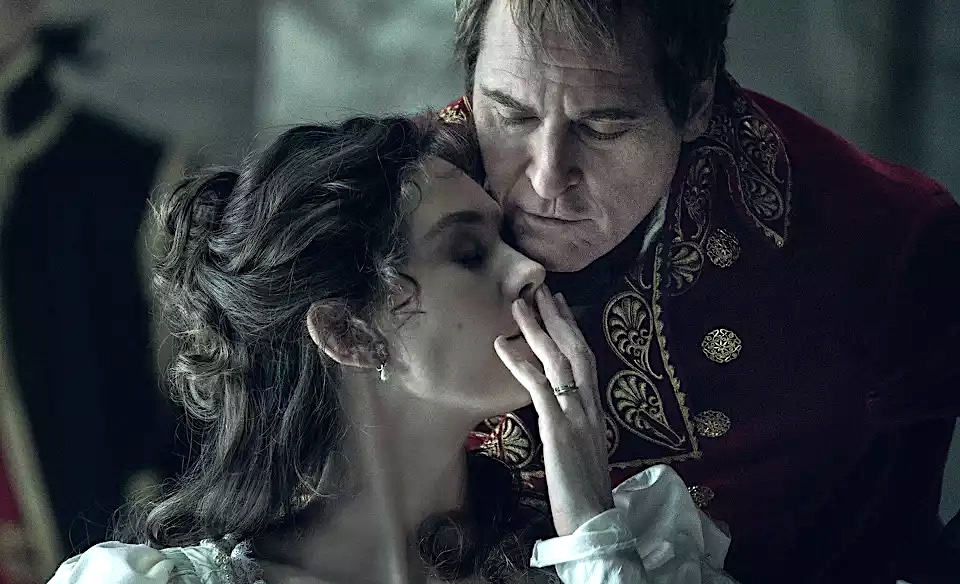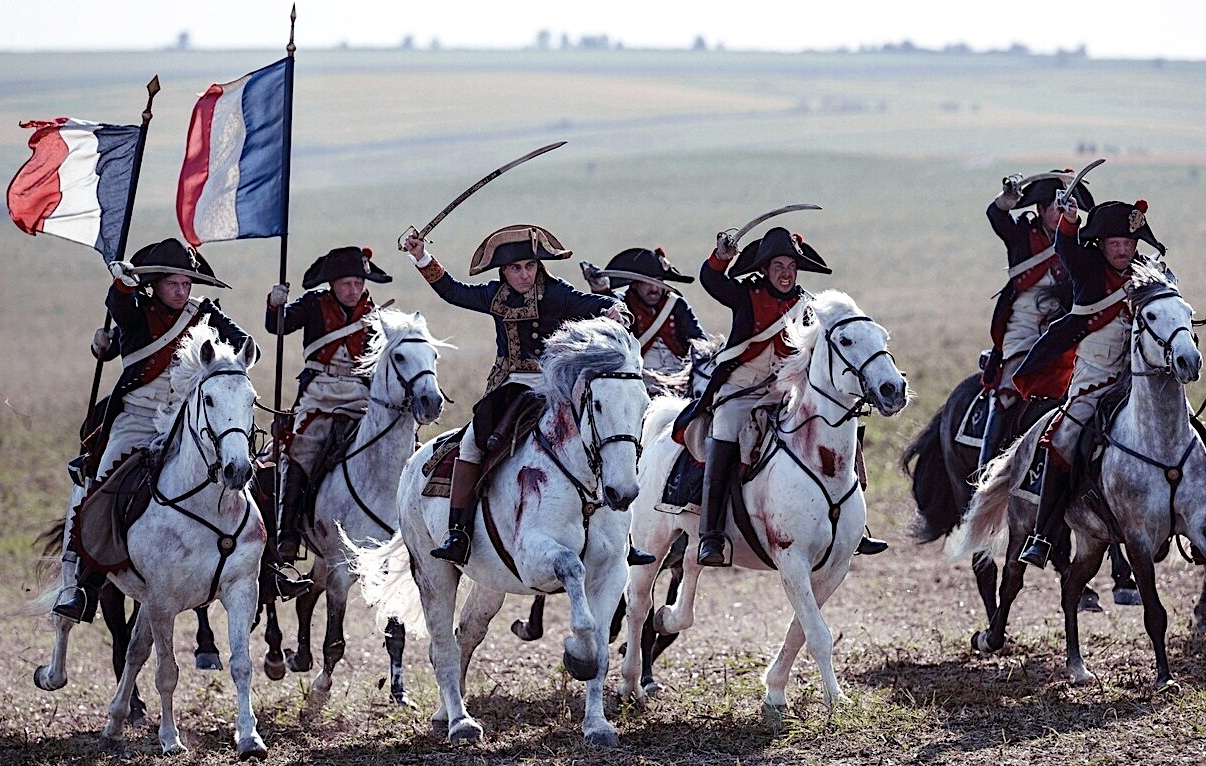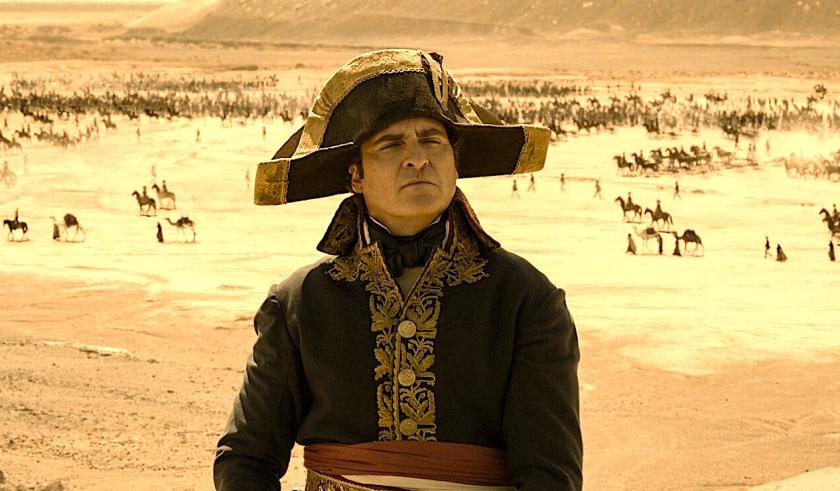Sir Ridley Scott has taken umbrage at the French critics who weren’t too impressed with his new movie. Not only do they not like his film, but the French “don’t even like themselves”, according to the dyspeptic auteur.
But I feel our French cousins may have a point, especially the one who described Joaquin Phoenix’s portrayal of the fabled emperor as “a sullen boor and a cad with his wife, Joséphine.” Like Steely Dan sang, “I have never met Napoleon”, but one might reasonably expect that a man who masterminded a European empire which stretched from Spain to Poland and temporarily as far as Moscow would be dynamic and charismatic, and probably rather intimidating. But Phoenix’s Napoleon seems merely surly and stubborn and possibly a trifle autistic, not the kind of guy who could pull huge armies across continents through sheer force of personality.
Phoenix’s slurred American accent is of little help in persuading us of his powers – if Sir Ridley had been really bold, he’d have had everyone speaking French with subtitles, but I guess that’s not very Hollywood – and the film gives us little sense of the political and military power structure Napoleon must have assembled around himself to enable his towering ambitions to be brought to fruition. It’s as if whatever Napoleon wants, he can just do it on a whim. There’s one comical moment when Empress Josephine (Vanessa Kirby) receives a letter from him, where he says oh dear, the Tsar has betrayed me so now I have to invade Russia. Just like that. (Pictured below, Kirby and Phoenix) Kirby, a terrific performer on a trajectory to superstardom, isn’t given a lot to work with. Her supposedly great love affair with Napoleon begins when he sees her across a crowded room and becomes instantly fixated on her, but there’s no sense of any deep emotional engagement. Within minutes, she’s having an indiscreet affair with another man (upon whom, oddly, Napoleon doesn’t wreak a terrible vengeance), and their marriage eventually founders because of her inability to produce an heir. When we belatedly hear Josephine’s voice from the afterlife proclaiming that theirs was the greatest love of all, it doesn’t really make any sense.
Kirby, a terrific performer on a trajectory to superstardom, isn’t given a lot to work with. Her supposedly great love affair with Napoleon begins when he sees her across a crowded room and becomes instantly fixated on her, but there’s no sense of any deep emotional engagement. Within minutes, she’s having an indiscreet affair with another man (upon whom, oddly, Napoleon doesn’t wreak a terrible vengeance), and their marriage eventually founders because of her inability to produce an heir. When we belatedly hear Josephine’s voice from the afterlife proclaiming that theirs was the greatest love of all, it doesn’t really make any sense.
It’s the battle sequences that give Napoleon its best chance of recouping its $200m production costs. David Scarpa’s screenplay boils down to a kind of Cole’s Notes guide to the little Emperor (though revisionist scholars now suggest that he was no shorter than average), with its set pieces ranging from the opening depiction of the French Revolution, with its beheading of Marie Antoinette before the baying mob, to the great watershed of Waterloo.
A key moment in Napoleon’s rise is his bashing of the Brits who have occupied Toulon. The way the British are pounded with mortars and then routed by Napoleon’s troops with their scaling ladders is thrillingly depicted, along with the subsequent bombardment of a very plausible-looking British fleet. The British, naturally, are depicted as sweary, oafish yobs. The battle of Austerlitz (Napoleon versus Austria and the Russians) focuses on the way the French lured their enemies onto a frozen lake and then bombarded it with cannon fire – cue dramatic underwater shots of the opposition drowning in the freezing water. Napoleon’s campaign in Egypt is brilliantly encapsulated in a breathtaking panorama of his armies spread across the desert against a vast backdrop of the Sphinx and the Pyramids. Even if shots of his gunners shelling the Pyramids have been deplored for their historical inaccuracy.
The battle of Austerlitz (Napoleon versus Austria and the Russians) focuses on the way the French lured their enemies onto a frozen lake and then bombarded it with cannon fire – cue dramatic underwater shots of the opposition drowning in the freezing water. Napoleon’s campaign in Egypt is brilliantly encapsulated in a breathtaking panorama of his armies spread across the desert against a vast backdrop of the Sphinx and the Pyramids. Even if shots of his gunners shelling the Pyramids have been deplored for their historical inaccuracy.
And then there’s Waterloo, a teeming wide-screen spectacle featuring a starring role for the British infantry’s squares which repelled Marshal Ney’s cavalry. It’s a feat of production wizardry, though a degree of bathos is introduced by Rupert Everett’s borderline-ludicrous portrayal of the Duke of Wellington. It’s like getting Oscar Wilde to play General Patton.
An array of acting talent flits fleetingly across the screen without getting much chance to make an impact (Mark Bonnar, Paul Rhys, Ben Miles etc), though Sinead Cusack puts in a neat turn as Napoleon’s mother Letizia. Presumably there’s a heap of footage that didn’t make the final cut. As it stands, this Napoleon feels like about half of what it should have been.















Add comment